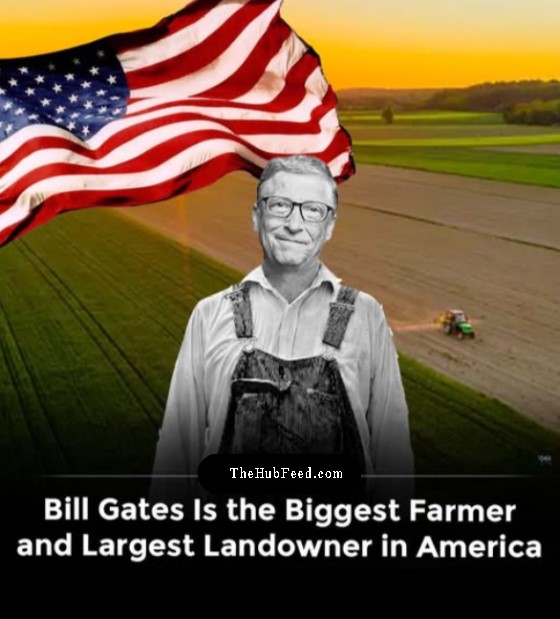Bill Gates’ Expansive Farmland Holdings: What Does It Mean for the Future of Agriculture?
Bill Gates, the co-founder of Microsoft and one of the world’s wealthiest individuals, has become the largest private farmland owner in the United States, with approximately 270,000 acres of farmland spread across 18 states. This substantial acquisition has raised eyebrows and sparked significant debate about the future of agriculture, sustainability, and food production in the U.S. As a growing number of billionaires invest in agricultural land, questions about the implications of such concentrated ownership are becoming increasingly important.
A Massive Farmland Portfolio
Gates’ farmland holdings include a diverse range of properties, from crop-producing fields to ranches and forests, strategically located in states like Louisiana, Arkansas, Arizona, and Nebraska. The majority of these lands are managed through the Cascade Investment Fund, which serves as Gates’ primary investment vehicle. While the motivation behind Gates’ extensive farmland acquisitions has been largely framed as part of his broader investment strategy, the scale and nature of these holdings have sparked concerns about the concentration of agricultural land in the hands of the ultra-wealthy.

The Debate: Impact on Agriculture and Sustainability
At the heart of the debate surrounding Gates’ farmland ownership are the implications for the future of U.S. agriculture. Supporters of Gates’ investments argue that his involvement in farming could bring innovative solutions to pressing issues in agriculture, such as sustainability and food security. Gates has long been a proponent of using technology to solve global challenges, and his farmland holdings are seen as an opportunity to experiment with sustainable farming practices and improve agricultural productivity through scientific advancements.
Gates has already expressed interest in using his farms to support climate-friendly agricultural techniques, including regenerative farming practices that focus on reducing carbon emissions and enhancing soil health. His investments in sustainable farming technologies and alternative protein sources, such as plant-based and lab-grown meat, also suggest that he sees agriculture as a critical component of his broader vision for addressing climate change.
On the other hand, critics argue that the concentration of farmland ownership among billionaires could have negative consequences for both small farmers and the environment. The growing trend of large-scale corporate ownership of farmland has raised concerns about the displacement of family-owned farms, which play a significant role in rural economies and the preservation of local farming traditions. With corporate interests controlling more land, critics fear that farming practices may shift toward maximizing profit rather than prioritizing sustainability or the well-being of local communities.
Moreover, the increasing trend of billionaire-owned farms may contribute to the rising cost of land, making it more difficult for young or aspiring farmers to enter the industry. As farmland prices climb, the barriers to entry for new farmers become steeper, potentially reducing the diversity of agricultural operations and the ability of smaller, independent farmers to compete.
The Sustainability Question
One of the key issues in the debate over Gates’ farmland holdings is the question of sustainability. While Gates has advocated for technological solutions to climate change, the sustainability of large-scale industrial farming remains a contentious topic. Industrial farming, which often involves monoculture cropping and heavy pesticide use, has been linked to soil degradation, water pollution, and biodiversity loss. Critics argue that the focus on high-tech, large-scale solutions could inadvertently exacerbate these problems rather than address them in a meaningful way.
However, Gates’ emphasis on innovation has led some to believe that his approach to farming could involve promoting regenerative agricultural practices, which prioritize biodiversity, soil health, and carbon sequestration. Regenerative farming techniques, such as crop rotation, cover cropping, and agroforestry, are seen as potential solutions to the environmental challenges facing modern agriculture. If Gates can effectively integrate these practices on his farms, his holdings could serve as a model for sustainable farming at a larger scale.
The Future of Food Production
As one of the world’s leading philanthropists, Gates has long been focused on global issues such as poverty, health, and climate change. His investments in agriculture, including his farmland holdings, align with his broader mission to improve food security and reduce hunger worldwide. Through the Gates Foundation, he has worked to support agricultural innovation in developing countries, and his ownership of U.S. farmland could help further his goals of advancing food production systems that are both sustainable and equitable.
Nevertheless, some experts caution that Gates’ approach to food production could risk reinforcing the trend of corporate control over food systems. The food industry has already seen the rise of large agribusinesses that prioritize profit over the welfare of small farmers, and there is concern that Gates’ farmland investments could further consolidate control over the global food supply.
Conclusion: A Shifting Landscape for U.S. Agriculture
Bill Gates’ acquisition of 270,000 acres of farmland is a significant development that has the potential to reshape the future of U.S. agriculture. While his investments could provide an opportunity to introduce innovative and sustainable farming practices, they also raise important questions about the implications of corporate and billionaire ownership of agricultural land. As the conversation about the role of large-scale investments in farming continues to evolve, it will be crucial to balance technological innovation with the needs of small farmers, local communities, and the environment. The future of agriculture will depend on how stakeholders—from policymakers to farmers to consumers—navigate these complex challenges and work toward a more sustainable and equitable food system.
